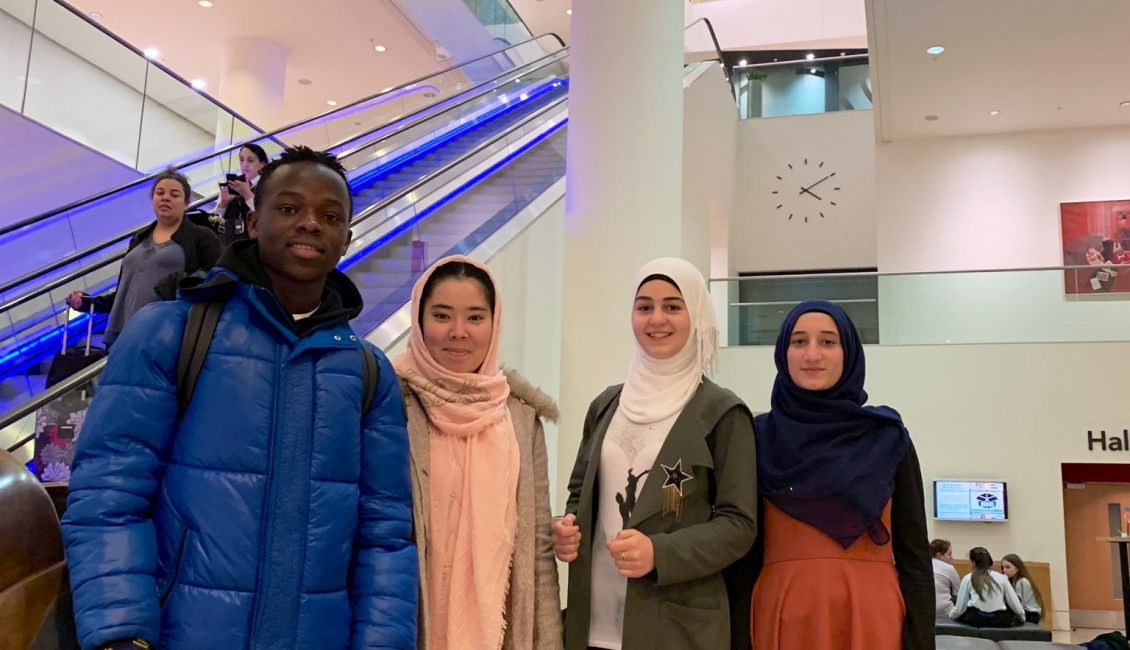
“Last Friday I had the rather strange experience of watching my students perform in my old college. Under the memorial plaques to writers Dorothy L Sayers and Winnifred Holtby and to Margaret Thatcher, GCSE and A level students from Oxford Spires Academy, a secondary school on the Cowley Road where I’m Head of Sixth Form, recited their poetry in a full Somerville chapel, to a gathered audience of alumni and the great and the good of Oxford. It was a great opportunity for them, and saw the college reaching out to a needy local school. So far, so ordinary (if something Somerville is more likely to do than many other colleges, perhaps).
But this wasn’t just an ordinary student poetry reading.
The following day, as we travelled to do the same thing to a sell-out audience at King’s Place in London, one of the students told me his story: how, in Nigeria, he had suffered violence at home, lived in terror of local gangs and police brutality, seen the corruption of political and everyday life around him in his home near Lagos, and tried not to see the regular burning alive of other human beings: acts of deterrence by the police to combat the growing problem of kidnappers who plagued his society. He told how he had moved house every couple of years as a smaller child, had never made real friends, had never really known his mother as she’d moved to the UK when he was three, and how, aged 16, he’d finally had to join her here with only 12 hours’ notice.
This young man was one of four students performing that weekend with similar stories of dislocation and missing childhood. With backgrounds in Afghanistan and Syria as well as Nigeria, and difficult journeys through Iran and Egypt to reach the UK, all the students had experienced more in their young lives than most of us manage in a lifetime. As one of the girls concluded her poem, her youth had been ‘… premature ageing’.
When Cayenna Ponchione-Bailey, a Music JRF at Somerville and a conductor of the Orchestra of St John’s, talked to me last summer about a project she was planning, that would put to music the voices of forced migrant children, I had no idea it would be such a life-enhancing – or such a harrowing – experience. She came to our school with composer Toby Young (the Gianturco JRF at Linacre), met with the four students, aged between 15 and 18, to find out about their lives and held workshops with them exploring how their poetry could be set to music: how the orchestral score could enhance and bring to a wider audience their ideas about their migrant journey, their love of their homeland or their reactions to their new English home that they had set down in their writing.
Perhaps it’s worth saying a word about Oxford Spires Academy and its poetry. The school – the former Oxford (Community) School In East Oxford – started to change from 2010. With a new Head, and a freshly recruited writer-in-residence (local author, Kate Clanchy) creativity became central to the life of the school. With poetry workshops, competitions for each year group, readings of poetry in school and beyond, and publications of our own ‘in-school’ anthologies, Kate has built up a poetic culture that enables students from all walks of life to find their voice – and win national competitions. Hot from victory in the Betjeman Prize, First Story National Competition, the Peregrine Prize, Foyle Young Poets of the Year, Cheltenham Literature Festival and others, students under Kate’s direction published in 2018 a Picador anthology: England, Poems from a School.
So when Cayenna suggested collaboration between these young people, Somerville and the Orchestra of St John’s, it seemed perfect. The concerts they have been part of, at Dorchester Abbey, in Somerville Chapel and at King’s Place in London, have played to packed audiences, and rapturous applause. Composers Shirley J Thompson and Sadie Harrison have joined Toby Young in producing superb new music for a song cycle for mezzo-soprano Charlotte Tetley, setting to music the work of other poets in the anthology. The students have developed confidence and poise, and flourished under the spotlight in front of such a talented orchestra. They have grown in so many ways as a result of the project.
Jan Royall has, since becoming Principal of the college, foregrounded the plight of young refugees and hosted packed discussion meetings to discuss how best people can understand their needs and can help. The performance on Friday 18 January in Somerville Chapel followed the third of these events, and the concert enacted the aim of the discussion: to listen to displaced voices. Oxford, one link in a chain of UK Cities of Sanctuary, has a noble history of welcoming enforced migrants, and this Somervillian and Oxford resident is proud to be connected with both a school embracing such students and a college that enacts its continuing ambition to ‘include the excluded’.
Jackie Watson, Oxford Spires Academy





